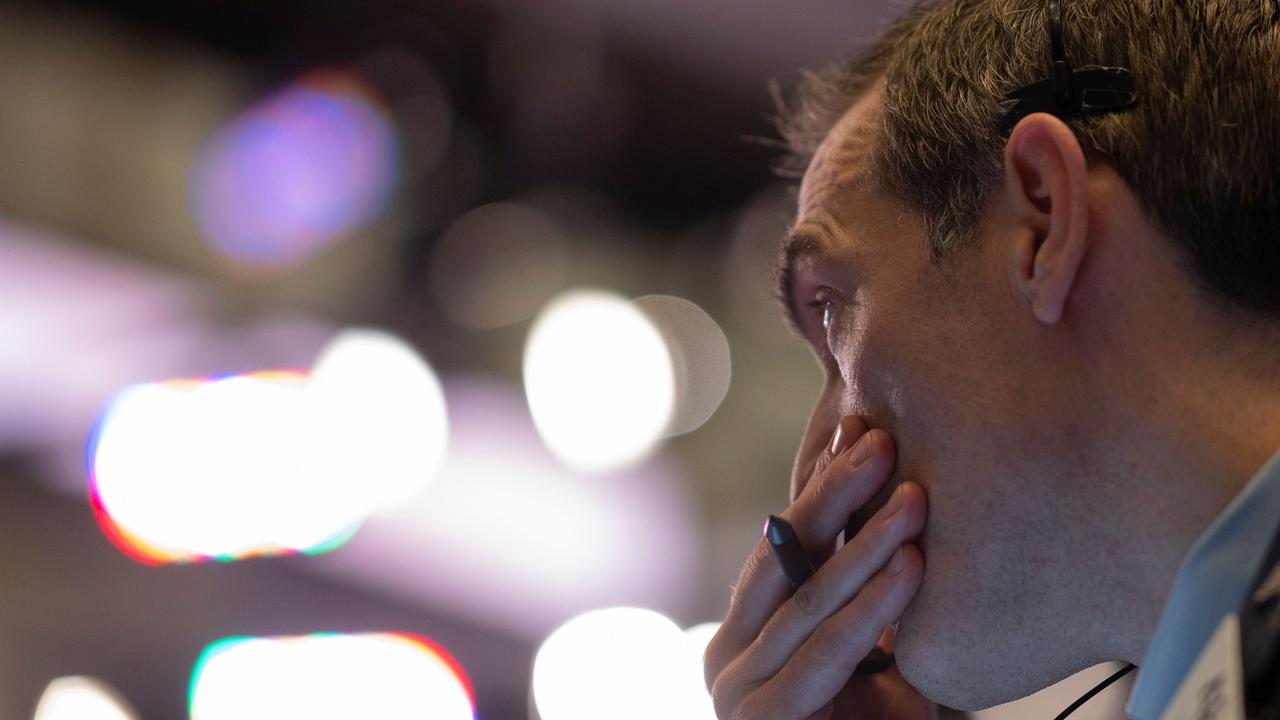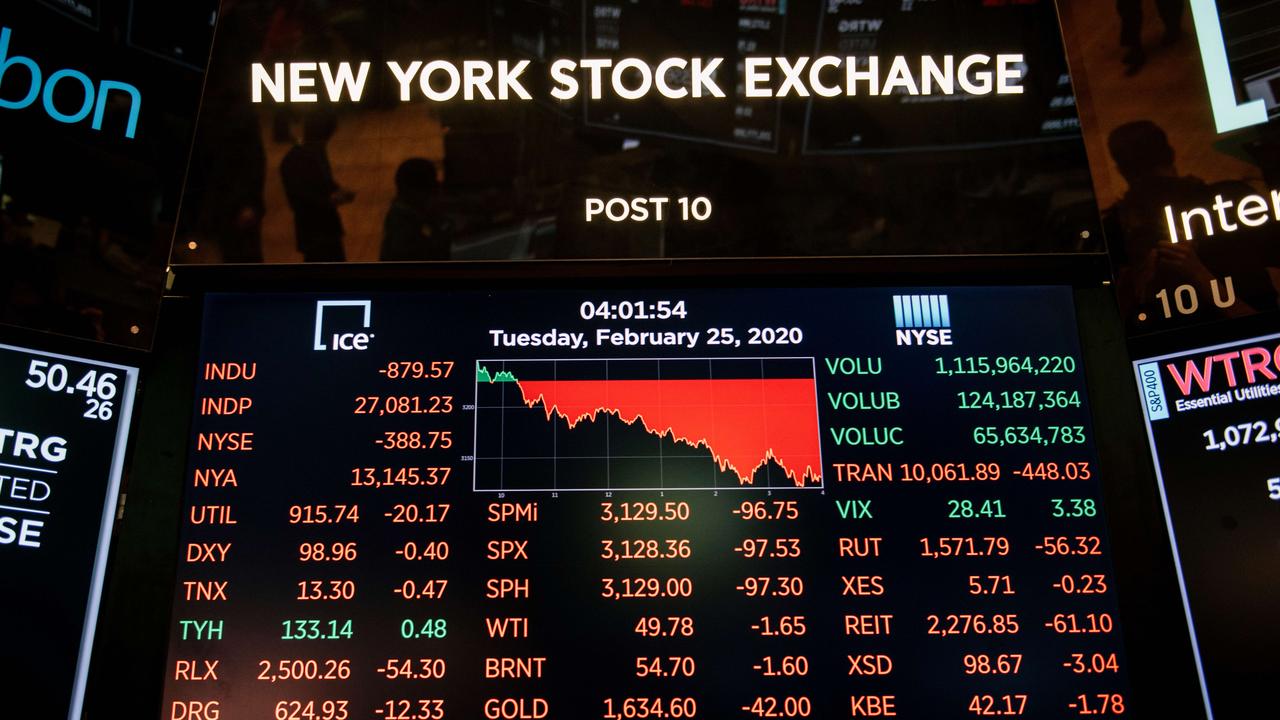Deadly outbreak wreaks havoc, sparking stock market tumble
Australia’s stock market has plunged more than 3 per cent in just minutes. It comes after the biggest point drop Wall Street’s history.
The Dow Jones has suffered its worst one-day drop in history as the coronavirus crisis pushed global markets into one of the worst weeks since the GFC.
The Dow Jones Industrial Average sank nearly 1200 points Thursday, deepening a weeklong global market rout caused by worries that the coronavirus outbreak will wreak havoc on the global economy.
The S & P 500 has now plunged 12 per cent from the all-time high it set just a week ago. That puts the index in what market watchers call a “correction,” which analysts have said was long overdue in this bull market, which is the longest in history.
It was the worst one-day drop for the market since 2011, and stocks are now headed for their worst week since October 2008, during the global financial crisis.
The losses extended a slide in stocks that has wiped out the solid gains major indexes posted early this year.
Investors came into 2020 feeling confident that the Federal Reserve would keep interest rates at low levels and the US-China trade war posed less of a threat to company profits after the two sides reached a preliminary agreement in January.

AUSTRALIA’S BLOODBATH
Australian shares have also plunged more than three per cent, with almost $50 billion wiped within minutes this morning.
The S & P/ASX200 index was down 203.3 points, or 3.05 per cent, at 6,454.6 at 1010 AEDT on Friday with all sectors in the red.
It’s the fifth consecutive day that the market has plumetted, wiping off approximately $200 billion from the market and wiping out all gains made this year.
The broader All Ordinaries index fell 209.6 points, or 3.11 per cent, to 6,527.8 points.
The local market has extended losses to 10 per cent since peaking last week.
Global equity markets and oil prices continued to dive overnight as the growth in coronavirus cases outside China jumped significantly on Thursday.
The Aussie dollar was buying 65.79 US cents at 1010 AEDT, up from 65.50 US cents at the market close on Thursday.
Harvey Norman and Rural Funds Group are among the Australian companies reporting their earnings on Friday.
VIRUS FEARS
The virus outbreak has up-ended that rosy scenario as economists lower their expectations for economic growth and companies warn of a hit to their business.
“This is a market that’s being driven completely by fear,” said Elaine Stokes, portfolio manager at Loomis Sayles, with market movements following the classic characteristics of a fear trade: stocks are down, commodities are down and bonds are up.
Bond prices soared again, sending the yield on the 10-year Treasury to another record low. When yields fall it’s a sign that investors are feeling less confident about the strength of the economy going forward.
More and more companies are warning that the outbreak will hurt their profits. Microsoft warned that the outbreak had interrupted its supply lines, following a similar warning last week from Apple. Crocs also fell sharply after saying its results would be hurt.
Energy stocks fell sharply as the price of oil dropped 3.4 per cent. Ms Stokes said the swoon reminded her of the market’s reaction following the September 11, 2001 terrorist attacks.
“Eventually we’re going to get to a place where this fear, it’s something that we get used to living with, the same way we got used to living with the threat of living with terrorism,” she said.
“But right now, people don’t know how or when we’re going to get there, and what people do in that situation is to retrench.”
The virus has now infected more than 82,000 people globally and is worrying governments with its rapid spread beyond the epicentre of China.
Japan will close schools nationwide to help control the spread of the new virus. Saudi Arabia banned foreign pilgrims from entering the kingdom to visit Islam’s holiest sites.
Italy has become the centre of the outbreak in Europe, with the spread threatening the financial and industrial centres of that nation.
At their heart, stock prices rise and fall with the profits that companies make. And Wall Street’s expectations for profit growth are sliding away. Apple and Microsoft, two of the world’s biggest companies, have already said their sales this quarter will feel the economic effects of the virus.

Goldman Sachs on Thursday said earnings for companies in the S & P 500 index might not grow at all this year, after predicting earlier that they would grow 5.5 per cent.
Strategist David Kostin also cut his growth forecast for earnings next year.
Besides a sharply weaker Chinese economy in the first quarter of this year, he sees lower demand for US exporters, disruptions to supply chains and general uncertainty eating away at earnings growth.
Such cuts are even more impactful now because stocks are already trading at high levels relative to their earnings, raising the risk.
Before the virus worries exploded, investors had been pushing stocks higher on expectations that strong profit growth was set to resume for companies.
The S & P 500 was recently trading at its most expensive level, relative to its expected earnings per share, since the dotcom bubble was deflating in 2002, according to FactSet.
If profit growth doesn’t ramp up this year, that makes a highly priced stock market even more vulnerable.
Goldman Sach’s Kostin said the S & P 500 could fall to 2900 in the near term, which would be a nearly 7 per cent drop from Wednesday’s close, before rebounding to 3400 by the end of the year.
Traders are growing increasingly certain that the Federal Reserve will be forced to cut interest rates to protect the economy, and soon.
They’re pricing in a nearly two-in-three probability of a cut at the Fed’s next meeting in March. Just a day before, they were calling for only a one-in-three chance, according to CME Group.
A handful of companies have managed to gain ground in the latest rout of stocks. Medical teleconferencing company Teladoc surged 15.7 per cent and 3M, which counts surgical masks among its many products, rose 0.8 per cent.
The market’s sharp drop this week partly reflects increasing fears among many economists that the US and global economies could take a bigger hit from the coronavirus than they previously thought.
Earlier assumptions that the impact would largely be contained in China and would temporarily disrupt manufacturing supply chains have been overtaken by concerns that as the virus spreads, more people in numerous countries will stay home, either voluntarily or under quarantine.
Holidays could be cancelled, restaurant meals skipped, and fewer shopping trips taken.
“A global recession is likely if COVID-19 becomes a pandemic, and the odds of that are uncomfortably high and rising with infections surging in Italy and Korea,” said Mark Zandi, chief economist at Moody’s Analytics.
The market rout will also likely weaken Americans’ confidence in the economy, analysts say, even among those who don’t own shares.
Such volatility can worry people about their own companies and job security.
In addition, Americans that do own stocks feel less wealthy. Both of those trends can combine to discourage consumer spending and slow growth.
MARKET ROUNDUP
• The S & P 500 fell 137.63 points, or 4.4 per cent, to 2,978.76
• The Dow fell 1,190.95 points, or 4.4 per cent, to 25,766.64
• The Nasdaq dropped 414.29 points, or 4.6 per cent, to 8,566.48
• The Russell 2000 index of smaller company stocks lost 54.89 points, or 3.5 per cent, to 1,497.87
• In commodities trading Thursday, benchmark crude oil fell $1.64 to settle at $47.09 a barrel • Brent crude oil, the international standard, dropped $1.25 to close at $52.18 a barrel
• Wholesale gasoline fell 4 cents to $1.41 per gallon
• Heating oil declined 1 cent to $1.49 per gallon
• Natural gas fell 7 cents to $1.75 per 1000 cubic feet
• Gold fell 40 cents to $1,640.00 per ounce, silver fell 18 cents to $17.66 per ounce and copper fell 1 cent to $2.57 per pound
• The dollar fell to 109.95 Japanese yen from 110.22 yen on Wednesday
• The euro strengthened to $1.0987 from $1.0897
- AP



